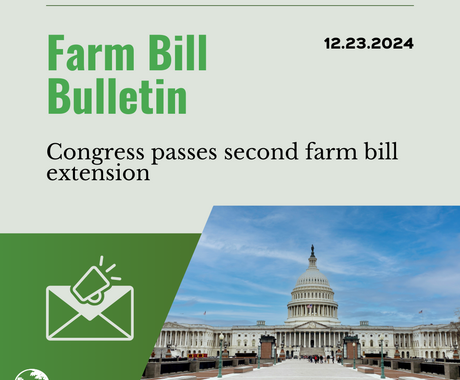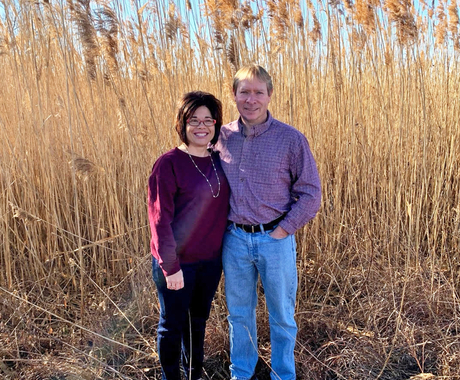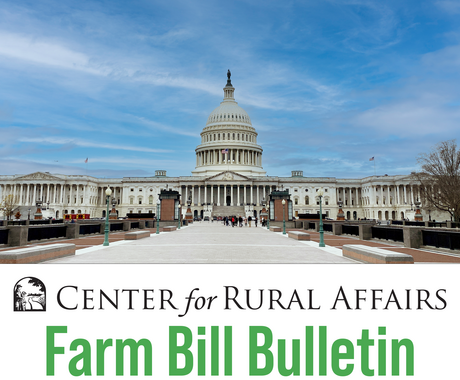We are in the seventh week of the 2024 Iowa legislative session, and the first funnel deadline is now behind us. Bills that did not pass out of their respective full committee last week are now considered “dead,” with a few exceptions.
Our staff has spent time at the Capitol advocating the past two weeks, with a focus on three bills.
First, our efforts on House File (HF) 2599 (formerly HF 2176), which would create the Grocer Reinvestment Fund and Program, resulted in the bill passing the first funnel. It advanced out of the House Economic Growth and Technology Committee last week with an amendment to include a local produce processing grant program. We supported this amendment, as it emphasizes the connection of produce production to sale and consumption. HF 2599 will go to the Economic Development Appropriations Subcommittee and, if passed there, be sent to the Senate for consideration.
Secondly, a bill relating to wind energy siting was introduced, and our staff testified at the subcommittee. The bill was not brought forward to the full committee and died ahead of the funnel deadline.
Finally, HF 2614 (formerly House Study Bill 674) was introduced with language impacting Watershed Management Authorities (WMA). This 37-page bill, written by the Iowa Department of Agriculture and Land Stewardship, focuses on soil and water resources and was passed before the first funnel. We support language in the bill to broaden the purview of soil and water conservation districts to prioritize soil health. However, we are concerned about language passed by the House Agriculture Committee last week that would restrict WMA dollars spent on water quality measures.
In other advocacy endeavors, we hosted the first-ever WMA Day at the Capitol with 15 of the 28 Authorities represented. Our staff also represented WMAs across the state at the Conservation Districts of Iowa Advocacy Day and attended the Iowa Flood Center legislative breakfast.
As always, we continue to monitor bills and amendments related to statewide siting standards for renewable energy and those addressing rural food systems and water quality.
If you have any questions, or would like to share the rural issues important to you, please do not hesitate to reach out at [email protected] or 402.687.2100 ext. 1034.
Thank you for making your rural voice heard.
Rural grocery
House File (HF) 2599 (formerly HF 2176) — Support: Rep. Brian Lohse introduced this bill in the House, and Rep. Chad Ingels has been serving as the floor manager. This Center priority bill would create the Grocer Reinvestment Fund and Program, appropriate money from the general fund, and give the Iowa Economic Development Authority direction to create a grant program for new or current grocery stores located in areas that are both underserved and low or moderate income. The legislation would prioritize cost-saving efforts and business efficiency measures to ensure the long-term sustainability of locally owned grocery stores. Additionally, this bill includes modifications to Iowa Code under the Local Food and Farm Program. It changes the purpose and goals of the program to include and increase the sale of local food in grocery stores. The bill now is amended to include a local produce processing grant program. Priorities will be given to entities planning to increase the availability, access, efficiency, and capacity of local foods in Iowa. Unfortunately, Senate Study Bill (SSB) 3074 did not pass on the Senate side. The House Economic Growth and Technology Committee met on Feb. 14 and recommended passage with the amendment. The bill is now renumbered and has been referred to the Appropriations Committee.
Water quality
HF 2614 (formerly House Study Bill 674) — Monitor: Introduced in the House Agriculture Committee, this bill relates to the conservation and improvement of soil and water resources, including a name change and presenting restrictions on watershed management authorities in Iowa. The bill would allow soil and water conservation districts to broaden their purview by prioritizing soil health. The language would require the WMA to spend all money on water quality nutrient reduction projects on practices designated by the Iowa Nutrient Reduction Strategy. The amendment approved through the Committee ahead of the funnel now strikes the water quality education and assessment restriction, but there are still limitations on how the money can be spent. There is not a companion bill in the Senate. The House Agriculture Committee met on Feb. 14 and recommended passage with the amendment. The bill is now renumbered and has been referred to the Appropriations Committee.
Renewable energy
SSB 3169 — Undecided: Introduced by Sen. Commerce Chairperson Waylon Brown, this bill would have removed a county's ability to self-regulate wind energy within their county by forcing Boards of Supervisors to pass wind energy ordinances that meet certain standards laid out in the bill. The bill had a Senate Commerce Subcommittee hearing on Tuesday, Feb. 13. While the standards laid out in the bill fell within the Center’s wind energy siting recommendations for counties, we oppose removing siting authority from the purview of counties. As a result, we provided verbal testimony advocating for an amendment that would make the standards voluntary, which would allow them to serve as guidance and a model, while maintaining local control. The bill passed out of subcommittee but was not heard by the full committee, therefore it fell short of the funnel deadline and is no longer viable.
SSB 3180 — Support: Introduced by Chairperson Waylon Brown, this bill would establish a community solar program with electric public utilities and set standards for billing methods. Currently, there are community solar programs that exist in Iowa, but this legislation would require public utilities to provide bill credits to subscribers of a project for their share of the energy produced by the project. This bill was introduced on Feb. 13 and passed out of the full Commerce Committee on Feb. 14. It is still alive.
HF 2279 — Monitor: Introduced by Reps. Hans Wilz, Brian Lohse, and Sean Bagniewski previously as HSB 555, this bill offers several amendments related to public utility laws, including the elimination of a reporting requirement for the Small Wind Innovation Zone program. Most notably, however, the bill would add nuclear and electric storage units to the definition of alternate energy production facilities. This adjustment would allow public utilities to include energy storage in advanced ratemaking cases, an important step in adequately planning for future public energy projects. The bill passed out of the House Commerce Committee on Jan. 30 and was placed on the House calendar on Feb. 1 and is still alive.
Other bills of interest
HF 2510/Senate File (SF) 2209 — Support: Proposed by the Iowa Department of Agriculture and Land Stewardship, this legislation relates to programs and regulations administered by the department. The Center supports two key components of the bill. The Choose Iowa Promotional Program provides consumers an opportunity to purchase food originating in the state, which is designated with the Choose Iowa logo. This legislation also creates the Value-Added Grant Fund and Program, which supports projects and services that add value to agricultural commodities produced in Iowa. These companion bills passed through their respective committees ahead of the funnel deadline and are renumbered as provided.
HF 2257/SF 2207 — Support: Proposed by the Iowa Department of Agriculture and Land Stewardship, this legislation proposes an amendment to the Meat and Poultry Inspection Act. The amendment would allow poultry processors to engage in custom operations if they maintain their state-licensed inspections. All packages processed on a custom basis must be marked “not for sale” and kept identified until the owner picks up the order. These companion bills passed through their respective committees ahead of the funnel deadline and are renumbered as provided.





